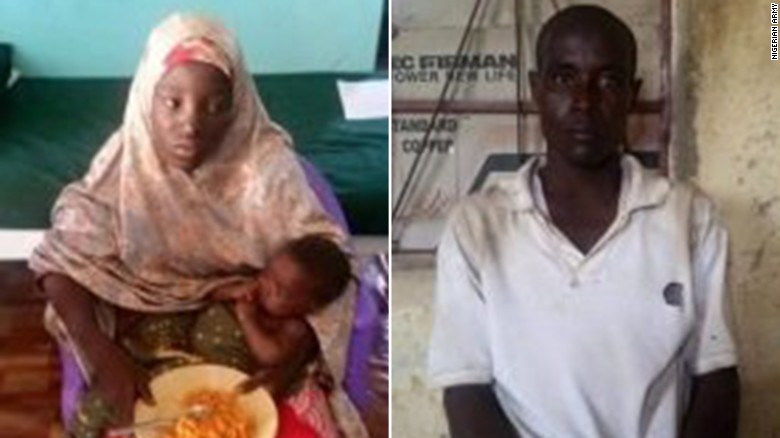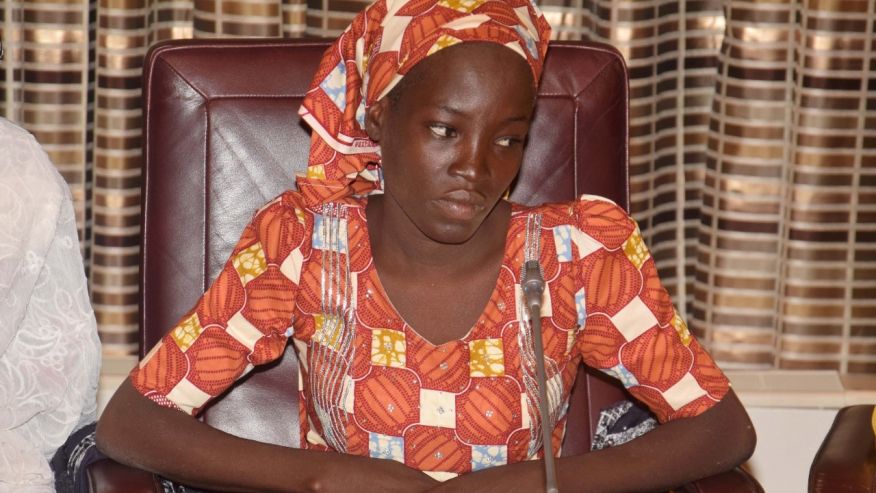Abuja, Nigeria (CNN). Escaped Chibok girl Amina Ali Nkeki says she misses her Boko Haram fighter husband and is still thinking about him three months after escaping the militants’ camp.
Courage to flee

Abuja, Nigeria (CNN). Escaped Chibok girl Amina Ali Nkeki says she misses her Boko Haram fighter husband and is still thinking about him three months after escaping the militants’ camp.


The fact that one Chibok girl basically rescued herself last week shouldn’t make any of us feel better.

The family of Amina Ali Nkeki has a reason to celebrate. The rest of the world does not.
The response from the Nigerian government and the Obama administration to one abducted Chibok girl’s escape last week is symptomatic of a larger issue. Real action – not just posturing and attention seeking – is needed to rescue these girls, now missing for more than two years.
I was hardly surprised to see the Nigerian government immediately attempting to celebrate (and take credit for) the purported rescue of a second Chibok girl just days after Amina’s escape – the second girl, it turned out, was not actually among those taken in the mass kidnapping in 2014. After all, the Nigerian government has been more preoccupied with securing positive international impressions than they have been about securing freedom for the Chibok girls.
Now more than ever, we need to refocus attention on Amina’s escape, as she is currently the only Chibok girl from the mass kidnapping to emerge after two years of captivity. Her self-rescue should fill leaders in the free world with shame on behalf of her classmates’ continued imprisonment.
This is not the time for the world to celebrate. This is the time to confront our shame.
How have we allowed more than 200 girls to remain trapped in captivity for over two years, held by one of the world’s most brutal terrorist groups?
Amina was found last Tuesday by local witnesses with her baby, wandering out of the Sambisa Forest in northern Nigeria. This location is known to be a Boko Haram stronghold and has been thought to be a possible location where the Chibok girls have been held.
Within hours of Amina’s sighting, the Nigerian government was—unsurprisingly—eagerly attempting to take credit for her release. Their attempts to capitalize are disgraceful; they also make me realize why the search for remaining Chibok girls has been so unfruitful. It appears that the Nigerian government has been much more concerned about good press than actual results on behalf of the captured schoolgirls. While the girls wait, cowardice and corruption continue to be the prevailing reality.
Within the Obama administration, we’re seeing hopeful words and hashtag advocacy on the ongoing captivity of the Chibok girls (with First Lady Michele Obama raising the issue by tweeting a photo of herself joining #BringBackOurGirls). But the one action from the administration that holds the most promise has yet to be accomplished. President Obama still hasn’t visited Nigeria during his nearly two full terms in office. Not once. (Obama is reported to currently be tinkering with the possibility of a trip to Nigeria in July. To that I say, better late than never.)
In an advocacy campaign launched earlier this year, Open Doors USA has been urging President Obama to prioritize a trip to Nigeria.
We’re also asking him to issue a statement on the desperate situation of persecuted Christians in Northern Nigeria, including the Chibok girls, as a result of Boko Haram and other groups.
We’re also encouraging him to put pressure on Nigerian President Muhammadu Buhari to support investigations into allegations that prominent Nigerian politicians have been funneling financial support to Boko Haram. It isn’t too late for more Americans to add their voices to our call for action.
Last week’s news of one girl’s freedom can and should be an opportunity to advocate for those still held captive. For Amina, much care will be needed to help her begin to heal the physical and emotional scars of her ordeal. But I cannot help but rejoice for her family as their personal nightmare comes to an end.
I visited with several of the fathers of the kidnapped Chibok girls while in Jos, Nigeria, several months ago. As director of advocacy at Open Doors USA, I wanted to hear firsthand about the challenges facing the families in the wake of their daughters’ disappearance.
What I witnessed broke my heart.
Open Doors is on the ground in Nigeria, providing trauma counseling and practical support for the families of the kidnapped girls. But the needs are very deep, and the heartache these families endure on a daily basis is gut wrenching.
I’m incredibly grateful that the pain of not knowing what happened to their daughter is over for one family. But the voices of the other fathers still ring in my ear.
After describing his daughter to me, one father put his head in his hands and wept, softly crying over and over, “I miss her, I miss her, I miss her,” as tears ran down his face.
As I discovered while I was in Jos, at least 18 of the parents of the missing Chibok girls have died in the wake of their daughters’ kidnapping.
Tragically, even as Amina, the newly recovered Chibok girl, is reunited with her mother, she will also be learning of the death of her father.
“They didn’t die of old age,” one Chibok father was quick to tell me of the parents who have died. “They died of heartache.”
This is not the time for the world to celebrate. This is the time to confront our shame.
The world’s silence—and the inexcusable inaction of our leaders—have allowed over 200 innocent girls to remain captives for two years. It is time to demand action and insist that we do whatever is in our power to rescue the Chibok girls and reunite them with their families.
For more information about Open Doors’ campaign for action on behalf of the Chibok girls and other victims of persecution in northern Nigeria, visit http://live.opendoorsusa.org/petition/.
Kristin Wright is the advocacy director at Open Doors USA. She works with government officials to address issues of religious persecution throughout the world, and take action for those who are suffering.
Copyright © 2024 | MH Magazine WordPress Theme by MH Themes